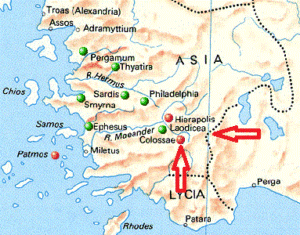COLOSSIANS
Author: Paul joined by Timothy
Date: A Prison letter, possibly around 61-63 A.D. from Rome. The letter is sent through Tychicus and Onesimus (4:7-9; Ph.10-12; Eph. 6:21-22).
Theme: Set your hearts on things above.
Key Place: Colossae, known simply as a small town. Hierapolis, a place for health, pleasure, and relaxation. Laodicea, known for its commercial trade and politics.

Epistle from Prison
Location:
Colossians, Ephesians, Philippians and Philemon were written in prison in Rome and sent through Tychicus and Onesimus.
To whomwritten: To the members of Colossians and to believers at large.
Key people: Paul, Timothy, Epaphras, Tychicus, Onesimus, Aristarchus
Background:
Colossae was mostly a pagan city, with a strong intermingling of Jews (in 62 B.C., there were 11,000 Jewish freemen in the tri-city area). This was bound to have some problems arising in the church both from pagan and Jewish origin. The church seems to have established during Paul’s extended stay at Ephesus, where the effect of his work spread throughout Asia Minor (Acts 19:8-10). Paul’s mentioning of “Epaphras one among them” (4:12) appears that Epaphras was originally belonging to Colossae. Paul also mentions in the epistle that Epaphras was the one who preached the Gospel there (1:5-8), in Hierapolis and Laodicea (4:12-13).
Philemon whom Apostle Paul sends a beautiful letter to receive his own runaway slave was from the church of Colossae (4:9). The church was meeting in Philemon’s house.

History:
Colossae was a city in the region of Phrygia in Asia Minor. The city sits in the Lycus Valley of Asia Minor, situated on the banks of the Lycus River, now in modern Turkey. It is named for its stone quarries and the unusually shaped stones nearby. The city is about a hundred miles east from Ephesus and just twelve miles from its arch-rival, Laodicea. Colossae was once a city of wealth and significance with its wool trade, but the Romans shifted the power over to Laodicea and Ephesus, so it became just a market stopover for travellers. Thus, the city was put in an economic downturn and the residents were going through difficulties of identity and economic issues, looking for something to inspire and motivate them as well as solve their problems (Col. 2:1; 4:13).